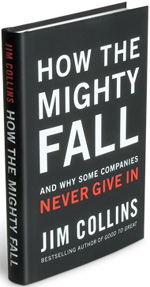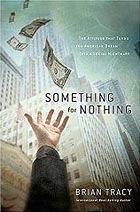 By Jim Collins –
By Jim Collins –
The author of Good to Great on how to spot the subtle signs that your successful company is actually on course to sputter—and how to reverse the slide before it’s too late.
I pondered and puzzled and finally settled upon the question: Is America renewing its greatness, or is America dangerously on the cusp of falling from great to good? While I intended the question to be rhetorical (I believe America carries a responsibility to continuously renew itself, and it has met that responsibility throughout its history), the West Point gathering nonetheless erupted into an intense debate. Half of the participants argued that America stands as strong as ever, while the other half contended that America teeters on the edge of decline.
History shows, repeatedly, that the mighty can fall. The Egyptian Old Kingdom, the Chou Dynasty, the Hittite Empire—all fell. Athens fell. Rome fell. Even Britain, which stood a century before as a global superpower, saw its position erode. Is that the U.S.’s fate? Or will America always find a way to meet Lincoln’s challenge to be the last best hope of Earth?
At a break, the chief executive of one of America’s most successful companies pulled me aside. “I’ve been thinking about your question in the context of my company all morning,” he said. “We’ve had tremendous success in recent years, and I worry about that. So what I want to know is: How would you know?” [Read more…]

